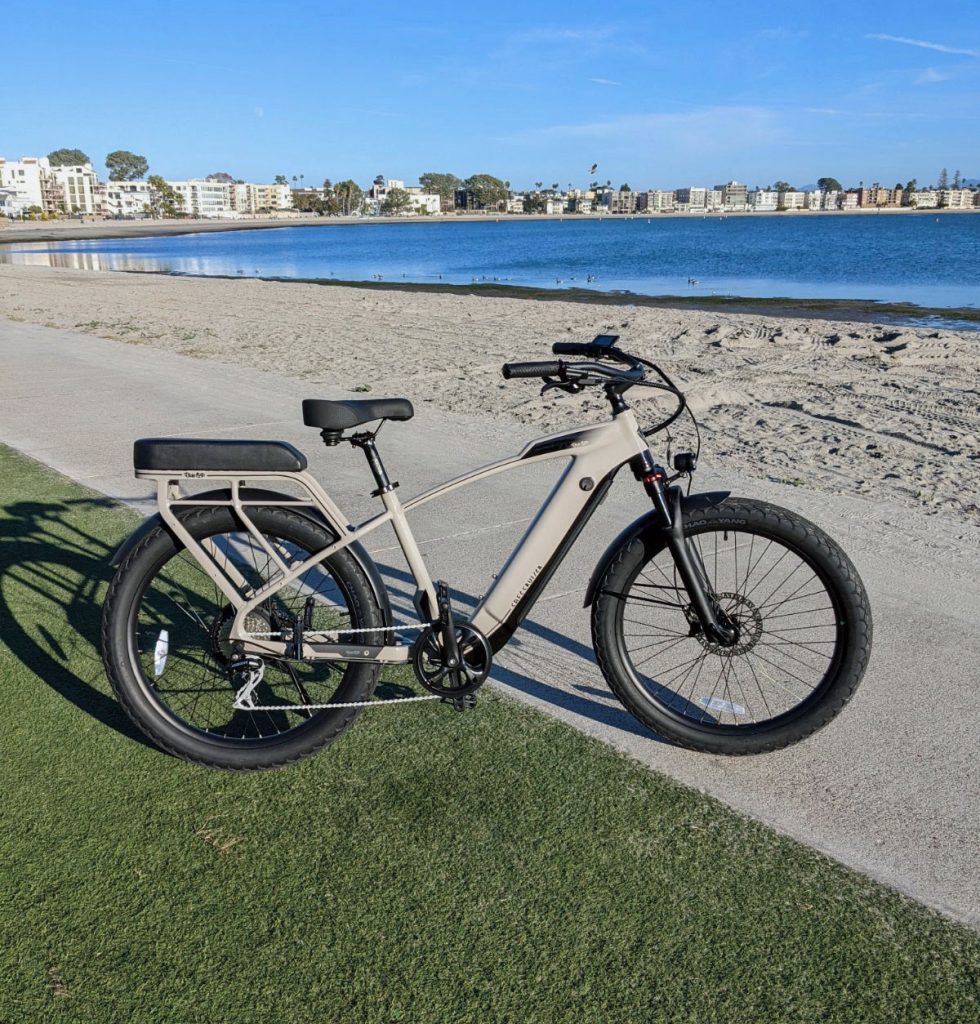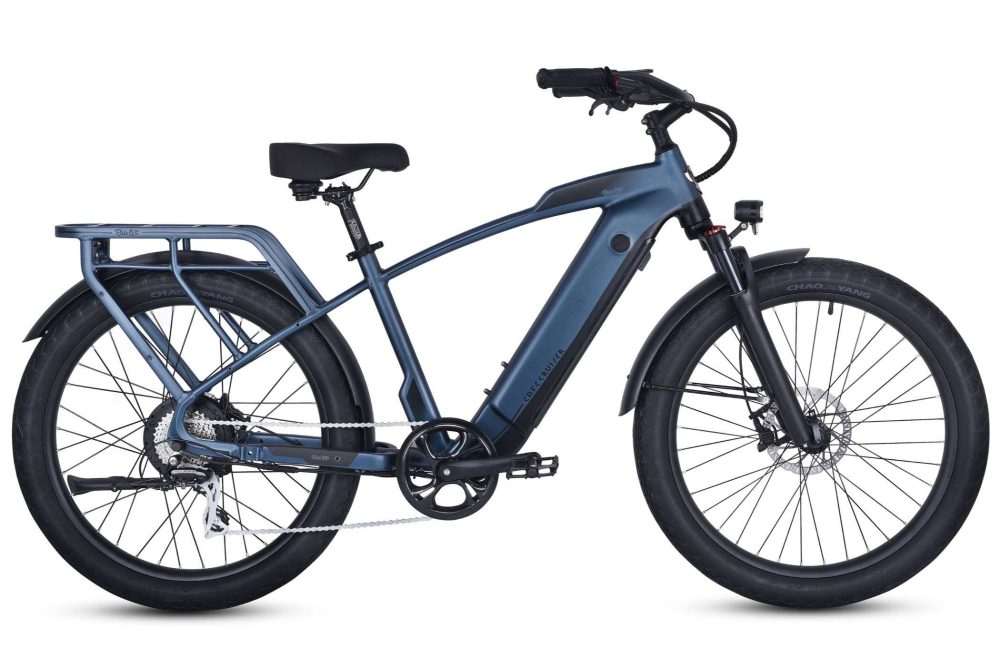
Last month, San Diego-based electric bicycle company Ride1Up unveiled its Cafe Cruiser electric bicycle. While many new electric bicycle models these days feature similar mashups of common features, the new Class 3 e-bike offered a retro-inspired design and seating for two passengers in a form factor we rarely see. It also marked a stark departure for the commuter-oriented electric bicycle company that designed it.
And the bike’s inclusion of parts, like a large 720 Wh hidden battery, hydraulic disc brakes, 80 mm hydraulic front suspension, and frame-integrated rack, made the $1,595 price even more impressive.
We don’t have one to test quite yet, as the bikes aren’t expected to ship until next month. But in the meantime, I caught up with Ride1Up’s founder and CEO Kevin Dugger to learn more about what went into creating a novel design for the electric bike.
The Cafe Cruiser’s fresh look is a welcome change for the industry. Many new e-bikes borrow heavily from established designs. And while the Cafe Cruiser isn’t entirely blameless (that top tank design looks very Electra-ish if you ask me), the bike is largely innovative in both form and function.
When I asked Kevin what led to the design, he explained that one need look no farther than the name.
“It’s all in the name: ‘Cafe Cruiser’. We tried to combine the two stylistic identities of a cafe racer-inspired bike and a beach cruiser. We didn’t want a standard short distance beach cruiser, but a more practical and functional beach cruiser, yet without losing the comfort that a beach cruiser offers. The end result is a beach cruiser that you can actually pedal for 40 miles and feel comfortable on at class 3 speeds.”
While many other companies have focused on electric mopeds or lifestyle e-bikes, Ride1Up’s lineup is full of no nonsense e-bikes that are fast, efficient, and fully-specced for trips to work, school, or the local coffee shop.

A beach cruiser-style electric bike is definitely new territory for Ride1Up. We’ve seen other companies produce beautiful beach cruisers, but Ride1Up has mostly stuck to what it knows: urban e-bikes.
Of course that made me curious about what led the company to branch out from its core of road and commuter-focused electric bikes.
According to Kevin, the company’s singular focus turned out to be the main reason that he decided to develop the Cafe Cruiser.
“A lot of our lineup had design and functional redundancies. The 500 Series and 700 Series were very similar in the type of riding and use. Not all commutes or car replacing trips meet the same criteria, and living in a beach town myself, there are many trips where you just want a casual comfortable ride. Additionally, we really wanted a +1, passenger capable bike. Most passenger bikes are kind of bulky/ugly, so I think the cruiser design could lend itself well to a passenger bike. So that’s what we set out to design.”
That passenger design is a rarity on full-size electric bikes like the Cafe Cruiser. While there are plenty of e-bikes designed to carry a second rider, most achieve that goal by dropping the wheel size.
The Cafe Cruiser maintains large 26″ wheels and rides on wide 3″ balloon tires, which should offer a cushy ride when combined with that hydraulic front fork. How well will that work with a rider’s weight high up? We’ll have to determine that once we can test the bike.
But as Kevin explained, offering a full-size e-bike with passenger capabilities was largely a logistics problem that had to be solved.
“I think the difficulty of a full size bike that is also passenger capable is the overall size and weight of the bike and box for delivery. This will be our largest box by a significant amount which adds a bit to shipping expenses, but we were able to keep the overall bike weight and size down, much lower than the current RadRover or the Aventon Adventure. Both of those bikes will be significantly heavier, priced $400 more, not offering passenger capabilities, and offering cheaper components.
We had the choice, just like other e-bike companies do, of whether to accept lower tier components (unbranded gearsets, etc.) and non-brand Chinese battery cells at lower costs, but we didn’t want to sacrifice our product. So we shifted our battery to 21700 cells where we are able to get the best performance per gram, avoid 18650 shortages and peak prices, and offer premium reputable Samsung cells. This bike will have only 39 cells and offer 720 watt-hours! This is a huge weight to battery size advantage for us.”

And even though the Cafe Cruiser looks set for recreational and leisure riding, it is also designed with utility in mind.
If not carrying passengers by using the passenger kit, the rear rack is still sturdy enough for cargo duty and can support up to 130 lb (59 kg).
According to Kevin, that was all by design.
“We don’t want to develop simply recreational bikes, but highly functional bikes. A lot of people here in San Diego were buying passenger capable bikes, whether that’s to take their kids to the beach, or take a date around town. They are demanding more from an e-bike, and honestly, e-bikes are perfectly positioned to support 2-passenger capabilities. I hope we see more unique, functional and stylish entrants in this field.”
Lastly, I wanted to know if this new path towards utility and leisure e-bikes was a direction that we’d see Ride1Up expand into further.
Could we be seeing more category-breaking designs from the company? A Ride1Up fat tire e-bike? Or perhaps a Ride1Up folding e-bike? Maybe a Ride1Up electric mountain bike?
Kevin advised me not to let my imagination run too wild, at least not yet.
“Well, our Prodigy e-bike is expanding our reach into the ‘mostly all-terrain’ market. We don’t want to become or compete with MTB companies by any means, but we have a lot more value and room to expand there.
We’re a little ways out from offering a ‘compact bike’ or a true ‘cargo’ designed bike. I don’t think we will ever get involved in the fat-tire space. Personally, I think the fat tire shelf life will not be as long and currently there are way too many options if that is a must have for you. It adds too much weight for little return in my opinion.”
Kevin and I will have to agree to disagree on that one. I love fat tire e-bikes and their ability to ride over just about any surface. He’s right that the weight disadvantage can be palpable, but for those that don’t need to lift an e-bike onto a car transporter or up stairs, the benefits outweigh the downsides – at least in my opinion.
But that’s the beauty of the huge breadth we see in the electric bicycle market. There are so many manufacturers with so many designs that riders are all but guaranteed to find something perfect for them.
With companies like Ride1Up beginning to expand into even more product categories, high value e-bikes are becoming even more attractive.
And to all the fat tire e-bike manufacturers out there, it sounds like you can rest easy. Kevin isn’t coming for you anytime soon.
Subscribe to Electrek on YouTube for exclusive videos and subscribe to the podcast.
Author: Micah Toll
Source: Electrek



